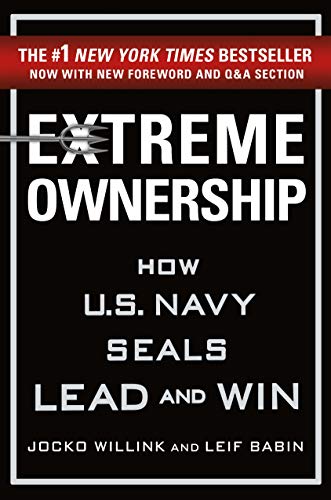After a handful of people recommending this book and finding a copy in my son’s old college books, I read it! I used it as the book of the month for a leadership book club I run.
Some parts were excellent, clear, concise, practical, and interesting. Some were hard for me to read (military stories). There are many tried and true leadership principles in the book. Life and death situations will sharpen and hone leadership lessons like nothing else, which will add validation.
With the war stories, I got lost in the abbreviations or details or uninterested in the details of the guns and war tactics. In some cases, the war stories were much more than the business or leadership part. They respectfully and tactfully tell their stories. I am most grateful for their service and their telling stories. My favorite story was about the boat races in training, which asks who will win – a poor team with a great leader or a poor leader with a great team?
My takeaways were extreme ownership, the first story and the last principle of discipline equals freedom. Some business parts were very lightweight, and not all were applied equally. I’m thinking about the planning principles. They were overly general and simplified.
The last section on the dichotomy of Leadership made so much sense and was excellent, so much so that I see that years later, they wrote a book just on that section. I wonder why they use “but” and not “and” in discussing opposing concepts.
Here are some key takeaways from the book (almost word for word) that I shared with my group:
Extreme ownership is an attitude, a mindset. Every leader must walk a fine line. That’s what makes Leadership so challenging.
• Discipline and Freedom are opposing forces that must be balanced.
• If a boss can’t decide promptly, or provide you with what you need, first blame yourself.
• Routinely communicate up and down the chain of command, don’t assume.
• Give clear guidance and set distinct boundaries for decision-making so subordinates can act independently towards your unified goal.
• Junior leaders must be proactive rather than reactive.
• Engage with them (stakeholders) and make them a part of your team, not an excuse for failure.
• In Seal teams, the bond of our brotherhood is our strongest weapon.
• There are no bad teams, only bad leaders.
• Success resulted from determination, will, innovation, and communication with the team.
• You can’t make people listen to you and execute. You have to lead them.
• The outcome is never certain; success is never guaranteed.
• Leaders must be comfortable under pressure and act with logic.
• Look at yourself if a team isn’t doing what you want.
Great basic leadership book with practical and straightforward advice, If you don’t mind military stories.

